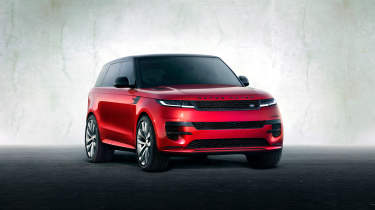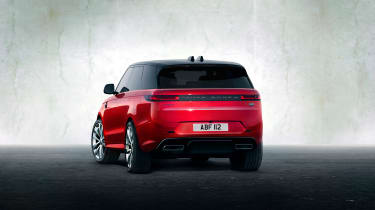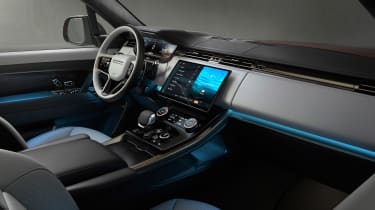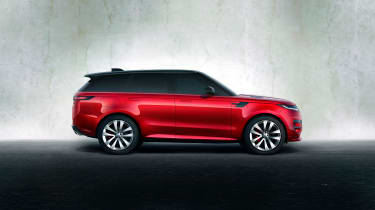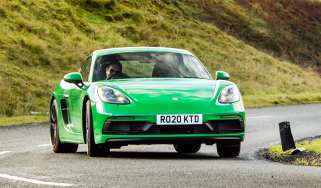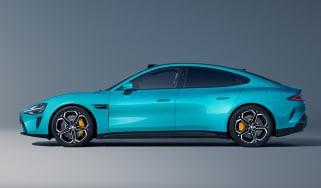All-new Range Rover Sport debuts with sleek new look
The next Range Rover Sport has arrived with all the highlights of its big brother, but in a more dynamic package
If Range Rover is queen, the Range Rover Sport is her property portfolio because in the monarchy of Land Rover it’s the smaller, but more populous Sport that contributes most to royal finances. So while the all-new Range Rover really has moved the game on with new technology and powertrains, it’s their application to the new Sport that Land Rover’s banking on helping to fill the company coffers.
If you’ve already taken a look into the specs of the new full-sized Range Rover, you’ll have a fairly good idea of what to expect with the new Sport as they share all key powertrain and chassis elements. These include a more rigid aluminium and mixed-metal monocoque structure paired with a range of powertrains made up from in-line six cylinder diesel and petrols, all with mild hybrid assistance. Plug-ins are also available pairing the in-line six petrol with an electric motor and 31kWh battery pack in both P440e and P510e forms, and finally there’s the P530, which utilises a twin-turbo 4.4-litre V8 engine from BMW.
All Range Rover Sport models exclusively utilise an eight-speed gearbox from ZF, with power going through all four-wheels via a full time all-wheel drive system. This time around Land Rover engineers have given the all-wheel drive system a distinct rear-drive bias, and bespoke to the Sport is a new ‘Stormer Handling Pack’ (a name referencing the concept car that preceded the original Range Rover Sport in 2004). The pack includes the full-sized Rangie’s rear-wheel steering, an electronically-controlled limited-slip differential with torque vectoring by braking, an active anti-roll system and fully configurable chassis modes. All models will incorporate two-chamber air suspension with twin-valve adaptive dampers that react faster, and with a wider bandwidth than before.
As has typically been the case with the Sport, Land Rover aims to instil a greater sense of connection to the road in the Sport in comparison to a full-sized Range Rover, with new calibrations for the air-springs, dampers and anti-roll bars. The air-springs themselves now also have the ability to vary their internal pressure depending on the driver mode for the first time, giving them more variability than the last Sport – something compounded when combined with the adaptive dampers. To reinforce this point, the optional rear-wheel steering’s ability to add up to 7.3deg of rear steering lock virtually shortens the wheelbase, which should make this the most agile Sport yet.
The main difference between the Sport and its full-fat sibling, though, is size with the Sport measuring 50mm lower and 106mm shorter. Both share the same width – a quite astonishing 2047mm (with the mirrors folded!), – and weight is down by around 70kg model for model, a surprisingly conservative figure given the substantial differences in some dimensions. As such, at its lightest the Range Rover Sport weighs in at 2265kg DIN (for the P360 petrol), and tops out at 2735kg for the plug-in P510e. Alongside the full-sized Range Rover, a pure-EV Sport will follow sometime in 2024, but specifics for that model are still under wraps.
On paper performance between all models is impressive given the masses involved, with 0-62mph times between 8sec (D250) and 5.9sec (D350) for the diesels, dropping to 5.7sec and 4.5sec for the P400 and P530 petrols. The plug-in P440e and P510e plug-ins take 5.8sec and 5.4sec, respectively.
Land Rover will soon reveal a new SVR with a higher state of tune from the BMW-sourced V8 engine, but the specifics – including whether it’ll utilise the existing N63 or M Division’s S63 unit – are also as yet unknown. We also expect that there’ll be a range of chassis tweaks that will make best use of all the new hardware.
Yet what’s most likely to sell the new Sport to prospective buyers is the new skin, one that draws a fine balance between the minimalist look of the new Range Rover and the Sport’s more casual motif. Designed under the eye of Land Rover Design Director Massimo Frascella, the Sport’s basic proportions have been largely maintained, with a little more space between the wheels and a marginally shorter rear overhang.
The lighting graphics take direct inspiration from the Velar and Evoque and feature cleaner graphics, but the Sport hasn’t gone quite as far as the full-sized Range Rover with its minimalist bumpers and invisible rear lights. Other fundamental design elements such as the flush-fitting door glass, flush handles and glazed pillars are used to clean up the profile, while the Sport holds onto traditional connected sills, with a greater emphasis on its flared wheel arches and aero management. Land Rover has also moved the rear plate down off the tailgate, wheel sizes of up to 23-inches are available.
It’s a similar story inside with the familiar curved 13.1-inch infotainment display, separated HVAC controls and driver information display all integrated into a more intimate cabin design. The centre console is set taller and flows into the main dash at a gentler angle than the full-sized Range Rover, and now forms a bridge over hidden storage underneath. The colour and trim options also reflect the Sport’s more informal positioning, with less grained wood and more technical finishes like bronzed metal and glossy black making up a majority of the interior’s material palette.
The new Range Rover Sport is available to order now, with prices starting from £79,125, nearly £15,000 more than the existing model. Of course, with the new full-sized Range Rover starting from £99,375, there’s still a sizeable gap between the two in terms of price.

